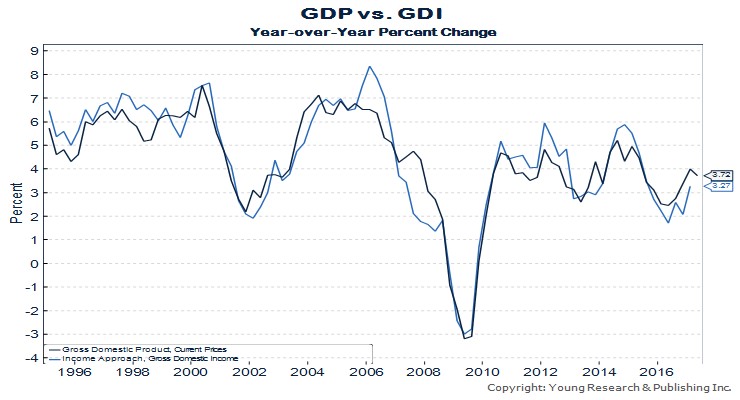On his great blog, International Liberty, Dan Mitchell, a senior fellow at the Cato Institute, makes a great case for using Gross Domestic Income (GDI) as a measure of economic growth, rather than Gross Domestic Product, which is the mostly widely used measure today.
Dan makes the point that in the long term, the two numbers should be identical, but in light of their short term divergences, using GDI would support better policy making.
In simple terms, GDI measures how our national income is generated and GDP measures how it is allocated.
As the Bureau of Economic Analysis explains, the two numbers are basically different sides of the same coin.
In national economic accounting, GDP and GDI are conceptually equal. GDP measures overall economic activity by final expenditures, and GDI measures it by the incomes generated from producing GDP. In practice, GDP and GDI differ because they are constructed using different sources of information. …when one looks at annual data – where the timing differences are less important, the correlation between GDP and GDI is 0.97.
That correlation shouldn’t be a surprise. Indeed, over a longer period of time, the two numbers should be identical.
Both go up when the economy is doing well, and both go down when there is a recession.
But I want to make a more subtle point.
The reason I like GDI over GDP is because one the former is more likely to lead people to support good policy while the latter is more likely to lead people in the direction of bad policy.
Here’s some of what I wrote on the topic back in 2013.
GDP numbers only measure how we spend or allocate our national income. It’s a very indirect way of measuring economic health. Sort of like assessing the status of your household finances by adding together how much you spend on everything from mortgage and groceries to your cable bill and your tab at the local pub. Wouldn’t it make much more sense to directly measure income? Isn’t the amount of money going into our bank accounts the key variable? The same principle is true – or should be true – for a country. That’s why the better variable is gross domestic income (GDI). It measures things such as employee compensation, corporate profits, and small business income. …We should be focusing on how to increase national income, not what share of it is being redistributed by politicians.
And, on a related note, you can back to 2009 for a column I wrote explaining that consumer spending is a reflection of a strong economy, not the cause of a strong economy.
Read more from Dan here.

E.J. Smith - Your Survival Guy
Latest posts by E.J. Smith - Your Survival Guy (see all)
- “What Do You Do If the Market Crashes?” - April 19, 2024
- Costco Gold Bars Sell Out Despite Premium Price - April 19, 2024
- A Wise Man’s Take on the Boston Bruins Playoff Chances - April 19, 2024
- Is Your Retirement Life a Mess? Let’s Talk - April 18, 2024
- Your Survival Guy Learns from Marie Kondo - April 18, 2024














